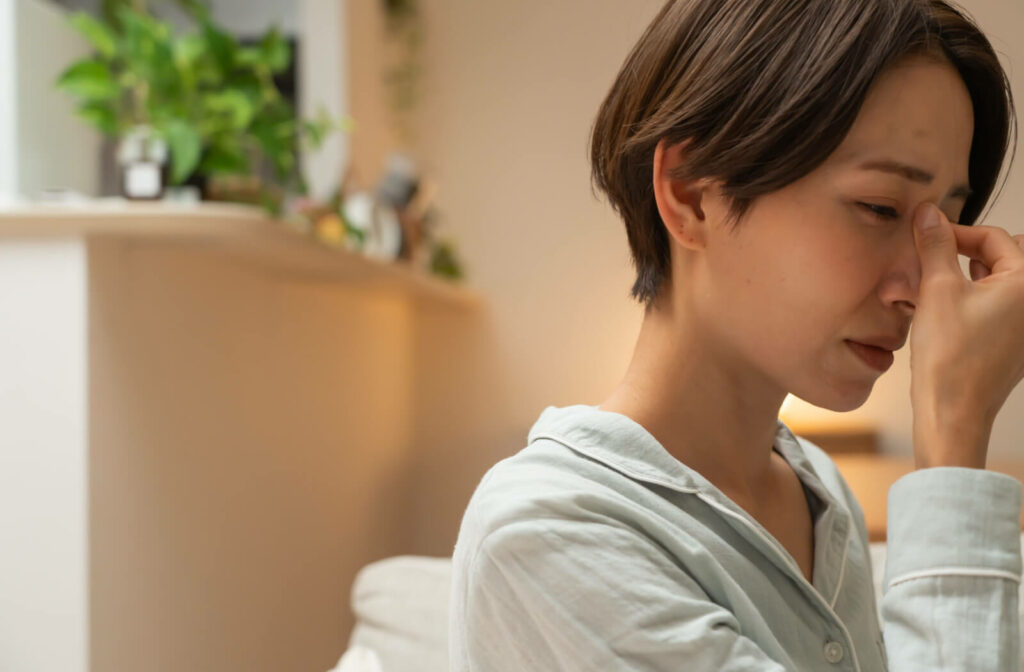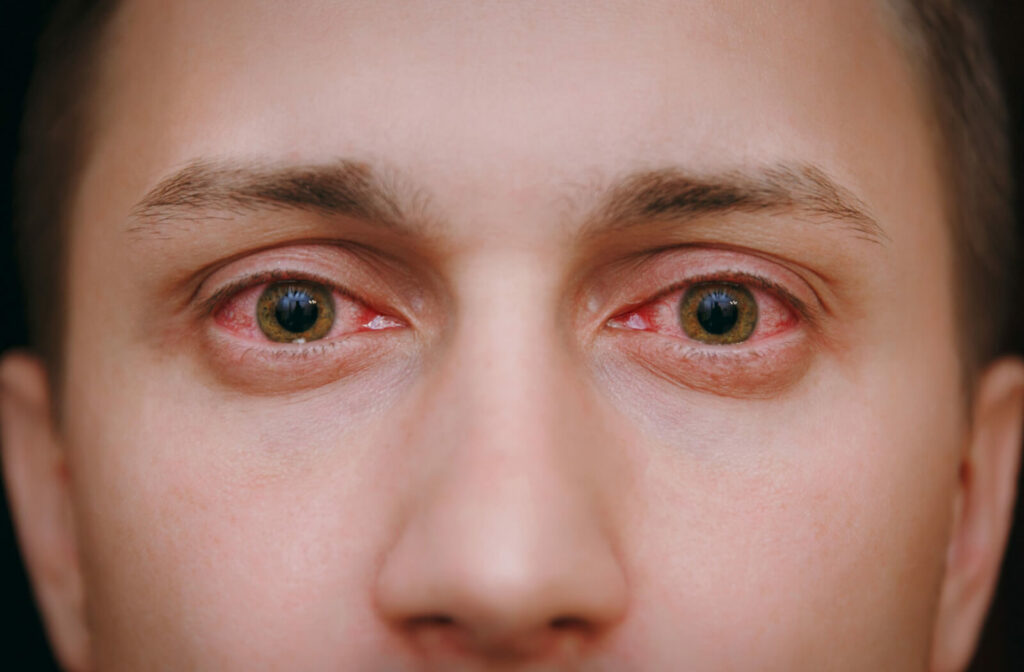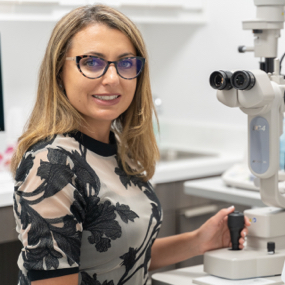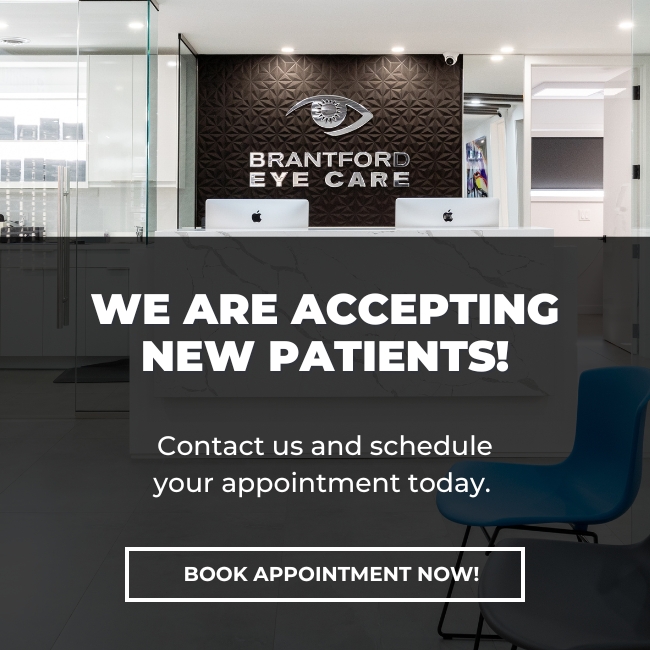Many people believe that sleeping with contact lenses is safe. So it’s no surprise that one-third of contact lens wearers sleep or nap with their contacts.
With a proper fit and prescription at your optometrist’s office, contact lenses may feel so comfortable you can forget you’re wearing a medical device in your eyes. We understand some days are too long, and you’d rather sleep with them than hassle with taking them out.
However, sleeping with contact lenses can increase your risk of developing eye infections by 6 to 8 times.
You can prevent contact lens-related eye problems by practicing proper contact lens wear and care habits and following your optometrist’s direction on the length of wear.
Contact Lenses & Your Eyes
Most contact lenses sit directly on the eyes. During the day or in waking hours, blinking helps oxygen to reach the eyes and keeps them moist.
While blood vessels in the eye also supply oxygen, wearing your contact lenses for too long or overnight can deprive your eyes of getting the oxygen required.
When you sleep or nap with contacts, your eyes are closed, and there is no blinking, which causes a reduction in oxygen supply (hypoxia).

Risks of Sleeping with Contact Lenses
Whether you wear contact lenses for vision correction or aesthetics, you’re at risk of infections. And wearing them for extended periods puts you at a higher risk of dry eyes and serious eye conditions:
Dry Eyes
Dry eyes occur when the eyes don’t produce enough or quality tears. There are several causes of this; one is contact lens-related dry eyes. Wearing contact lenses for long periods can decrease tear production.
Keratitis
Keratitis is inflammation of the cornea (clear outer part of the eye). Bacterial keratitis is common in people who wear contact lenses for too long or use extended-wear contact lenses.
Corneal Neovascularization
A common cause of corneal neovascularization is hypoxia from contact lens wear. When there is a lack of oxygen in the cornea, the formation of new blood vessels invades the cornea.
Corneal Abrasion
A corneal abrasion or scratched cornea can result from a contact lens itself. If not treated, a corneal abrasion can lead to infection or a corneal ulcer.
Signs of an Eye Infection
Visit your optometrist immediately if you notice the following signs associated with wearing contact lenses when you sleep, as they can indicate a possible eye infection:
- Red eyes
- Eye pain and discomfort
- Excess tearing or discharge
- Light sensitivity
- Irritated eyes
- Gritty feeling in the eye
- Blurry vision
- Swelling
I’ve Worn My Contacts Overnight: Now What?
If you wake up in the morning and realize you forgot to remove your contacts, don’t panic. Follow these steps:
- Remove your contact lenses as soon as possible.
- If they’re hard to remove, use a sterile contact lens solution for added lubrication. Do not tug at the contact lenses.
- Do not reinsert your contacts. Give your eyes a break by wearing eyeglasses for the day.
- Look for signs of an infection and get in touch with your optometrist if you notice any. h
- Schedule a reminder before bed to remove your contact lenses.
Contact Lenses Approved for Sleeping
Daily contact lenses require you to remove them when you sleep. Extended-wear contact lenses are available for overnight wear and usually come in soft contact lenses.
Even though they are silicone hydrogel for more breathability, some cases show a significant increase in the risk of eye problems, regardless of lens material and frequency.
Rigid gas permeable (RGP) lenses used in orthokeratology are hard lenses available for overnight use (at least 8 hours) and removed during the day. They are used to help correct myopia or nearsightedness.
These lenses, prescribed for overnight wear, change the cornea’s curvature when you sleep for adequate vision during the day without needing glasses or contacts. However, the effects are temporary, as the cornea can revert to its original shape when you stop wearing the contacts.
Tips to Keep Your Eyes Healthy When Wearing Contact Lenses
If you’re a contact lens wearer, there are steps you can take to prevent long-term damage to your eyes:
- Always wash your hands thoroughly with soap and water before handling contacts.
- Clean and store your lenses in contact lens solution only. A saline solution or tap water is not suitable for disinfecting your lenses.
- Never top up lens solution. Always replace it with fresh disinfecting solution in your lens case every day.
- Replace your contact lenses as recommended.
- Replace your contact lens case every 3 months.
- Avoid sleeping in your contact lenses.
Proper Contact Lens Wear for Healthy Eyes & Vision
Even if you’ve previously worn contact lenses at night with no problem, it doesn’t mean you’re not at risk.
Book an appointment with the optometrists at Brantford Eye Care to discuss your vision needs and ocular health, and determine what contact lenses best suit your eyes.




